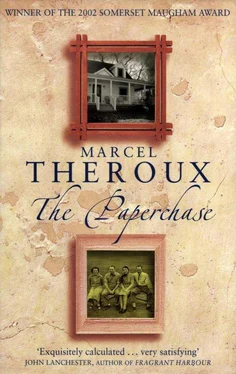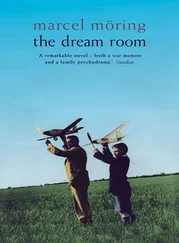Mr Diaz joked with his secretary for my benefit as he passed on his instructions to her over the intercom. ‘First we lock him out of his house, then we forget to send him his inventory. He must be wondering how I stay in business.’
The burglary involved me in several days of boring hassle with insurers, passport offices and the airline which had only two high points. One was using Mr Diaz’s office as a base for making phone calls and receiving faxes. I found myself enjoying being in an office again and flirted with a pretty paralegal called Stephanie, who unfortunately turned out to have a serious boyfriend. The other was my first-ever identity parade.
Officers Topper and Santorelli waited with me behind the one-way mirror while the suspects were marched in.
My guy — Bill Kelly — could hardly have been more conspicuous if he’d had three arms. He was the only one in the line-up who looked like he had spent the night in a bush. He had an uneven skull like a bumpy old potato — I heard later it was caused by an industrial accident — and I recognised the slack, unshaven face that I’d seen poking out of the bin-bag.
Leaving the police station, I was hopeful that I might find out what Kelly had done with my plane ticket and passports at least, but he remained adamant that he was not responsible for the break-in. He claimed he had been sleeping on the beach when he had been woken up by the rain. He wasn’t sure where he got the trash-bag sou’wester he had been wearing when I saw him, but eventually ‘remembered’ seeing a new-model Japanese four-by-four parked in my driveway.
‘Right,’ I said to Officer Santorelli. ‘In other words, the car that belonged to the real burglar.’
‘He says he took nothing from the house.’
‘But you don’t think he’s telling the truth?’
‘I’m not paid to have opinions, I’m paid to catch bad guys,’ said the policeman. I was beginning to miss Officer Topper and his signet ring. Officer Santorelli was a pencil-thin Italian American whose meagre physique somehow suited his officious, cheese-paring manner. He went on: ‘There have been cases — I’m not saying this is one of them — where collectibles are stolen to order. This kind of crime on the island has just exploded in the last couple of years. I guess the only way of knowing for sure is to go through the inventory and check it’s all there.’
I was so furious I could barely bring myself to speak to the trauma counsellor who came round to visit me — and turned out to be Officer Topper. ‘We’re a small force,’ he admitted. ‘We need to multitask.’
‘I’m very keen to get my property back,’ I said. ‘I would be inclined not to press charges against Mr Kelly if he just told me where I could find my passports and plane ticket. This whole … debacle’ — if in doubt with an authority figure it’s always good to slip in some ten-dollar words — ‘comes at a very unpropitious time for me.’
Officer Topper nodded sadly and told me that the first stage in overcoming any form of loss is learning to accept it.
After half an hour of this nonsense, he tried to engage me in another genealogical discussion but I couldn’t bring myself to humour him. People trace their genealogy to find out who they are, but as you climb up a family tree, the branches multiply exponentially. You don’t arrive anywhere, you dissolve into atoms, into primordial soup. Ten generations back, we all have one thousand direct ancestors and that number continues to double as you go further and further into the past. Who knew how many generations there were between Officer Topper and the Siege of Acre? He might have had a million ancestors alive at that time. There was a chance he was related to My Lord de Pearse, but there was an equal chance that he was related to some poxy old falafel seller in the Saracen army, or a one-eyed washerwoman who gave hand jobs to the Norman cavalry. We’ve all got kings, peasants, blackguards, bishops and salt-of-the-earth village blacksmiths in our ancestry.
But fixating on some probably spurious ancestors was no more ridiculous than what Patrick had done. Out of all the objects in the world, Patrick had chosen a handful with some arbitrary association to himself and designated them to be his legacy. Keeping it all together was so important that he’d made arrangements for its survival beyond his own life into the Patrick-less world that came after him.
I began to wish that Bill Kelly had just taken the whole lot and saved me from my role in perpetuating a dead man’s foolishness.
IF THE POLICE BELIEVED that the likeliest villains were a gang of well-organised crooks who wanted to get their hands on my uncle’s cup-plate collection, it wasn’t my business to contradict them. In fact, it seemed more sensible to go along with their theory and inflate my insurance claim accordingly. I wasn’t hopeful that I would see much of the money myself, but I figured I might get some, and besides, the idea of selling or hiding some of Patrick’s beloved possessions satisfied an irrational desire for revenge on the house and its contents. At the back of my mind, I think I knew that I was behaving like someone who kicks a table leg after he’s barked his shin on it. All the same, I was determined to find some things in the house worth stealing.
Patrick had word-processed the inventory on his computer, a machine so obsolete it used floppy disks that looked as if they belonged in the jukebox. The printer was no less antique. It typed the text through a ribbon in a feeble, crabbed font that I remembered from letters he’d sent me at school. The document itself was two hundred and fifty pages long. I imagined Patrick revising it lovingly over long winter months, adding to it, elaborating his descriptions of the objects. Its tony prose read like the brochure of the auction house where I’d worked during my summer holidays: ‘twin-handled chamber pot in Sèvres porcelain, hand-painted with rosettes of acanthus leaves’; ‘four blown-glass decanters mounted in buffalo-hide tantalus, monogrammed in gold lettering, TWO’.
More than half of the pages dealt with his book and record collections, but I decided that in the interest of realism, I’d set these sections aside at first. The thief I had in mind was an opportunist with no special knowledge of the house. It would strain credibility for him to be sifting through the filing cabinets of 45s in the hope of unearthing a rare piece of vinyl. Similarly, I knew various books were definitely missing from the library — having seen Edgar Huvas making off with them at the Greyhound station in Providence — but a bibliophile burglar was an unlikely apparition. My thief — and I was beginning to feel as if I knew him quite well — was more of a magpie. He would have sneaked in, grabbed the shiniest, most valuable-looking things he could find and made off with them.
The difficulty was that even the most optimistic or desperate burglar would have looked around Patrick’s kitchen with a sinking heart. I imagined the beam of his flashlight flickering over the penny-banks. He might have rummaged through the drawers over the sink looking for some cash. All he would have found were ‘five lace-trimmed tea towels in Derbyshire needlepoint’. Maybe he’d snatched the painting from above the kitchen table — ‘contemporary landscape in Primitive style by Martha Calhoun of Dennis, Mass. Painted in 1983 and signed by the artist’ — only to realise it was a picture of the house he was burgling. The burglar who tried to fence that might as well include an arrow showing where he’d got in.
I opened the inventory at random and stabbed at the page: ‘Alpine wineskin with hand-carved wooden stopper’ — hopeless.
Another stab: ‘authentic Gurkha kukri with notched blade. Cased in original leather scabbard.’ I remembered the knife — it looked like something for peeling potatoes. Then: ‘hand-painted satirical Russian matryoshka dolls’. I turned over half a dozen pages impatiently. This was more like it: ‘pair of early nineteenth-century English duelling pistols with chased silver handles’. Without thinking what I was doing, I put a tick by it on the list.
Читать дальше












